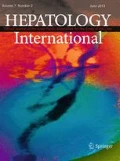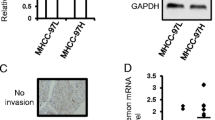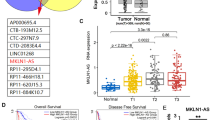Abstract
Background
Pokemon, a master oncogene crucial for the tumorigenicity and progression of a variety of cancers, has been demonstrated to enhance the proliferation and survival of hepatocellular carcinoma (HCC). However, the contribution of Pokemon to the invasiveness of HCC has not yet been studied.
Methods
In this study, we employed HCC cells to investigate the role of Pokemon in the invasion of HCC with multidisciplinary approaches.
Results
Pokemon overexpression was found to be closely associated with invasion and intrahepatic metastasis of HCC in clinical specimens. Suppression of Pokemon attenuated the invasion of HCC cells by in vitro transwell and wound-healing assays. Myocyte enhancer factor 2D (MEF2D), an oncogene that can promote the invasiveness of HCC, was found to be underexpressed during Pokemon silencing in HCC cells. Restoration of MEF2D abolished the effect of Pokemon downregulation on the migration of HCC cells. Further experiments verified that Pokemon binds two putative recognition sites located within the upstream region of the MEF2D promoter and enhances its transcription. The association between Pokemon and MEF2D was further confirmed in HCC specimens. Animal experiments further confirmed that Pokemon downregulation attenuated the metastasis of HCC cells in mice.
Conclusion
Collectively, Pokemon was found to enhance the migration and invasion of HCC by increasing MEF2D expression. Thus, targeting Pokemon and MEF2D may be an effective strategy to suppress the metastasis of HCC.









Similar content being viewed by others
References
Maeda T, Hobbs RM, Merghoub T, Guernah I, Zelent A, Cordon-Cardo C, et al. Role of the proto-oncogene Pokemon in cellular transformation and ARF repression. Nature 2005;433:278–285
He S, Liu F, Xie Z, Zu X, Xu W, Jiang Y. P-Glycoprotein/MDR1 regulates pokemon gene transcription through p53 expression in human breast cancer cells. Int J Mol Sci 2010;11:3039–3051
Lin CC, Zhou JP, Liu YP, Liu JJ, Yang XN, Jazag A, et al . The silencing of Pokemon attenuates the proliferation of hepatocellular carcinoma cells in vitro and in vivo by inhibiting the PI3 K/Akt pathway. PLoS ONE 2012;7:e51916
Zhang QL, Tian DA, Xu XJ. Depletion of Pokemon gene inhibits hepatocellular carcinoma cell growth through inhibition of H-ras. Onkologie 2011;34:526–531
Zhang YQ, Xiao CX, Lin BY, Shi Y, Liu YP, Liu JJ, et al. Silencing of Pokemon enhances caspase-dependent apoptosis via fas- and mitochondria-mediated pathways in hepatocellular carcinoma cells. PLoS ONE 2013;8:e68981
Liu K, Liu F, Zhang N, Liu S, Jiang Y. Pokemon Silencing Leads to Bim-Mediated Anoikis of Human Hepatoma Cell QGY7703. Int J Mol Sci 2012;13:5818–5831
Zhang NN, Sun QS, Chen Z, Liu F, Jiang YY. Homeostatic regulatory role of Pokemon in NF-kappaB signaling: stimulating both p65 and IkappaBalpha expression in human hepatocellular carcinoma cells. Mol Cell Biochem 2013;372:57–64
Jin XL, Sun QS, Liu F, Yang HW, Liu M, Liu HX, et al. microRNA 21-mediated suppression of Sprouty1 by Pokemon affects liver cancer cell growth and proliferation. J Cell Biochem 2013;114:1625–1633
Ding Y, Wang W, Feng M, Wang Y, Zhou J, Ding X, et al. A biomimetic nanovector-mediated targeted cholesterol-conjugated siRNA delivery for tumor gene therapy. Biomaterials 2012;33:8893–8905
Potthoff MJ, Olson EN. MEF2: a central regulator of diverse developmental programs. Development 2007;134:4131–4140
Ma L, Liu J, Liu L, Duan G, Wang Q, Xu Y, et al. Overexpression of the transcription factor MEF2D in hepatocellular carcinoma sustains malignant character by suppressing G2-M transition genes. Cancer Res 2014;74:1452–1462
Yu W, Huang C, Wang Q, Huang T, Ding Y, Ma C, et al. MEF2 transcription factors promotes EMT and invasiveness of hepatocellular carcinoma through TGF-beta1 autoregulation circuitry. Tumour Biol 2014;35:10943–10951
Li W, Kidiyoor A, Hu Y, Guo C, Liu M, Yao X, et al. Evaluation of transforming growth factor-beta1 suppress Pokemon/epithelial-mesenchymal transition expression in human bladder cancer cells. Tumour Biol 2015;36:1155–1162
Yang X, Zu X, Tang J, Xiong W, Zhang Y, Liu F, et al. Zbtb7 suppresses the expression of CDK2 and E2F4 in liver cancer cells: implications for the role of Zbtb7 in cell cycle regulation. Mol Med Rep 2012;5:1475–1480
Zu X, Ma J, Liu H, Liu F, Tan C, Yu L, et al. Pro-oncogene Pokemon promotes breast cancer progression by upregulating survivin expression. Breast Cancer Res 2011;13:R26
Funding
This study was funded by the Jiangsu Provincial Special Program of Medical Science (BL2013021) and the Huai’an Science foundation (SN12037).
Author information
Authors and Affiliations
Corresponding author
Ethics declarations
Conflict of interest
Jing Kong, Xiaoping Liu, Xiangqian Li, Jinsheng Wu, Ning Wu, Jun Chen, and Fang Fang declare that they have no conflict of interest.
Ethical standards
All procedures followed were in accordance with the ethical standards of the responsible committee on human experimentation (Huai’an First People’s Hospital, China) and with the Helsinki Declaration of 1975, as revised in 2008. Informed consent was obtained from all patients for being included in the study. Fresh HCC samples were collected from patients with their written informed consent at the Department of Hepatopancreatobiliary Surgery, Huai’an First People’s Hospital (Huai’an, China). This study had been approved by the Ethical Review Board in the Review Board of Huai’an First People’s Hospital (No. 201403, Huai’an, China).
Electronic supplementary material
Below is the link to the electronic supplementary material.
Rights and permissions
About this article
Cite this article
Kong, J., Liu, X., Li, X. et al. Pokemon promotes the invasiveness of hepatocellular carcinoma by enhancing MEF2D transcription. Hepatol Int 10, 493–500 (2016). https://doi.org/10.1007/s12072-015-9697-y
Received:
Accepted:
Published:
Issue Date:
DOI: https://doi.org/10.1007/s12072-015-9697-y




